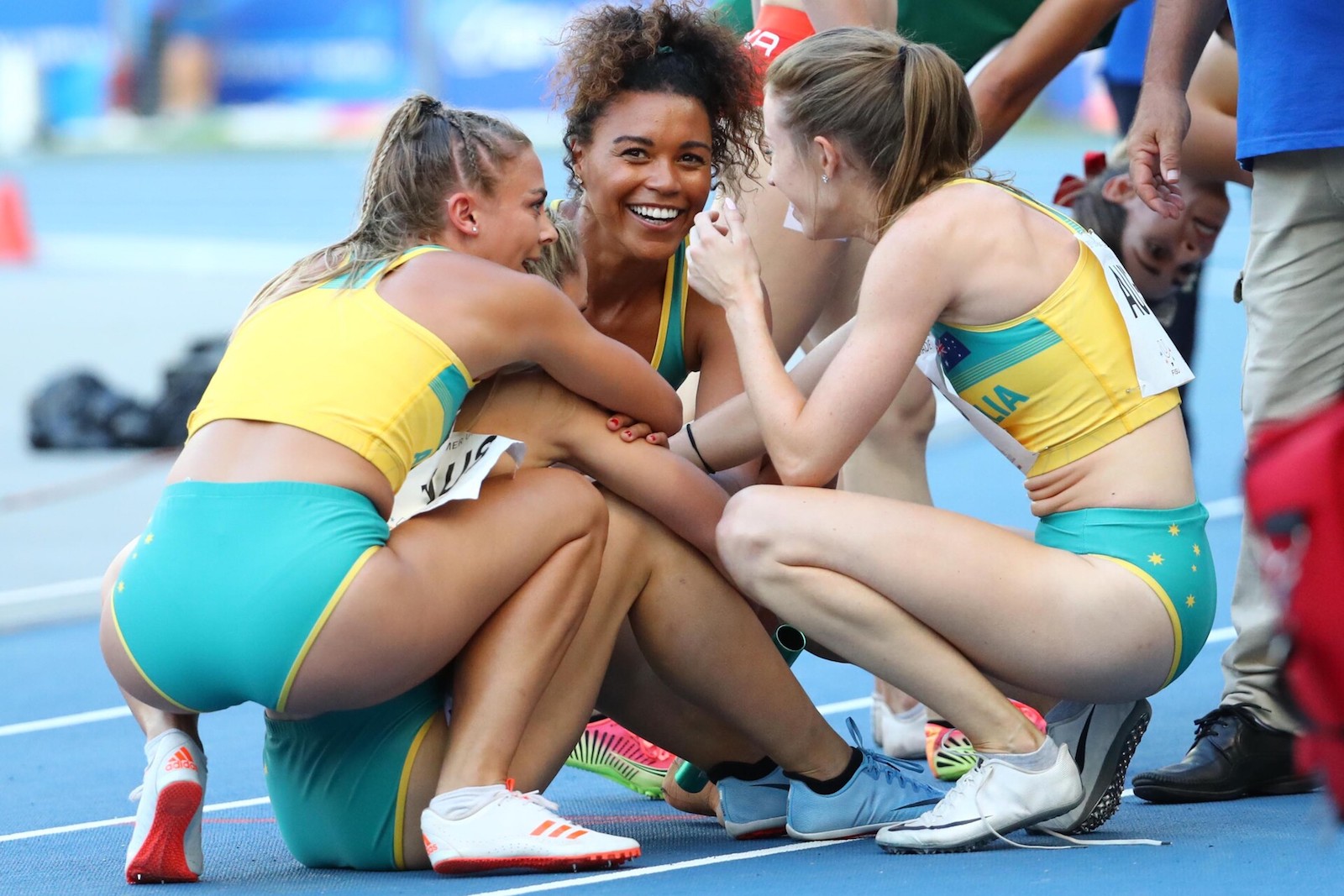
“When you consider the fact that as much as 65% of the Australian Olympic team at Tokyo could be university students, you realise the importance of the dual career concept,” says David Schmude, the recently elected FISU Oceania President and FISU Executive Committee member.
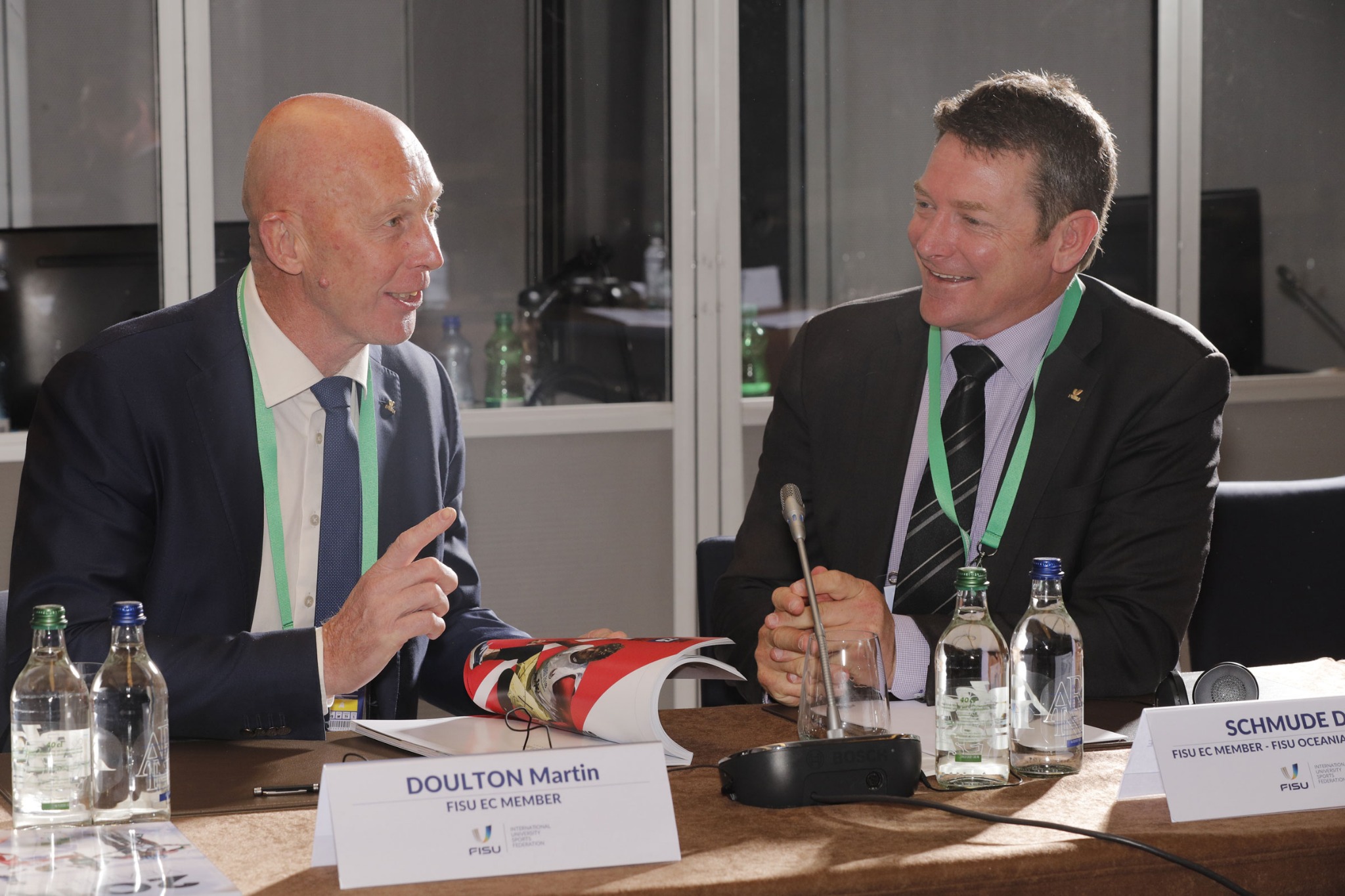 FISU EC Member Martin Doulton (L) and David Schmude discuss future plans for FISU Oceania and UniSport Australia“That’s a massive percentage,” continues Schmude. “Similarly, at the Commonwealth Games two years ago, 63% of the medals won by Australia were won by university students.”
FISU EC Member Martin Doulton (L) and David Schmude discuss future plans for FISU Oceania and UniSport Australia“That’s a massive percentage,” continues Schmude. “Similarly, at the Commonwealth Games two years ago, 63% of the medals won by Australia were won by university students.”
“The plan in Australia and New Zealand right now is to strengthen relationships with the National Olympic Committees, especially around the dual career aspect,” adds Martin Doulton, FISU Executive Committee member.
Towards this, UniSport Australia have undertaken a five-part sector survey to examine sports facilities, number of elite athletes, general participation figures and a whole host of other related metrics to determine the size of the university sports sector in the country.
“We have finished with the first part of this survey,” says Doulton, “And it is powerful data to help the government, communities and the Australian Olympic Committee understand the significant contribution universities make to the sports sector in Australia.”
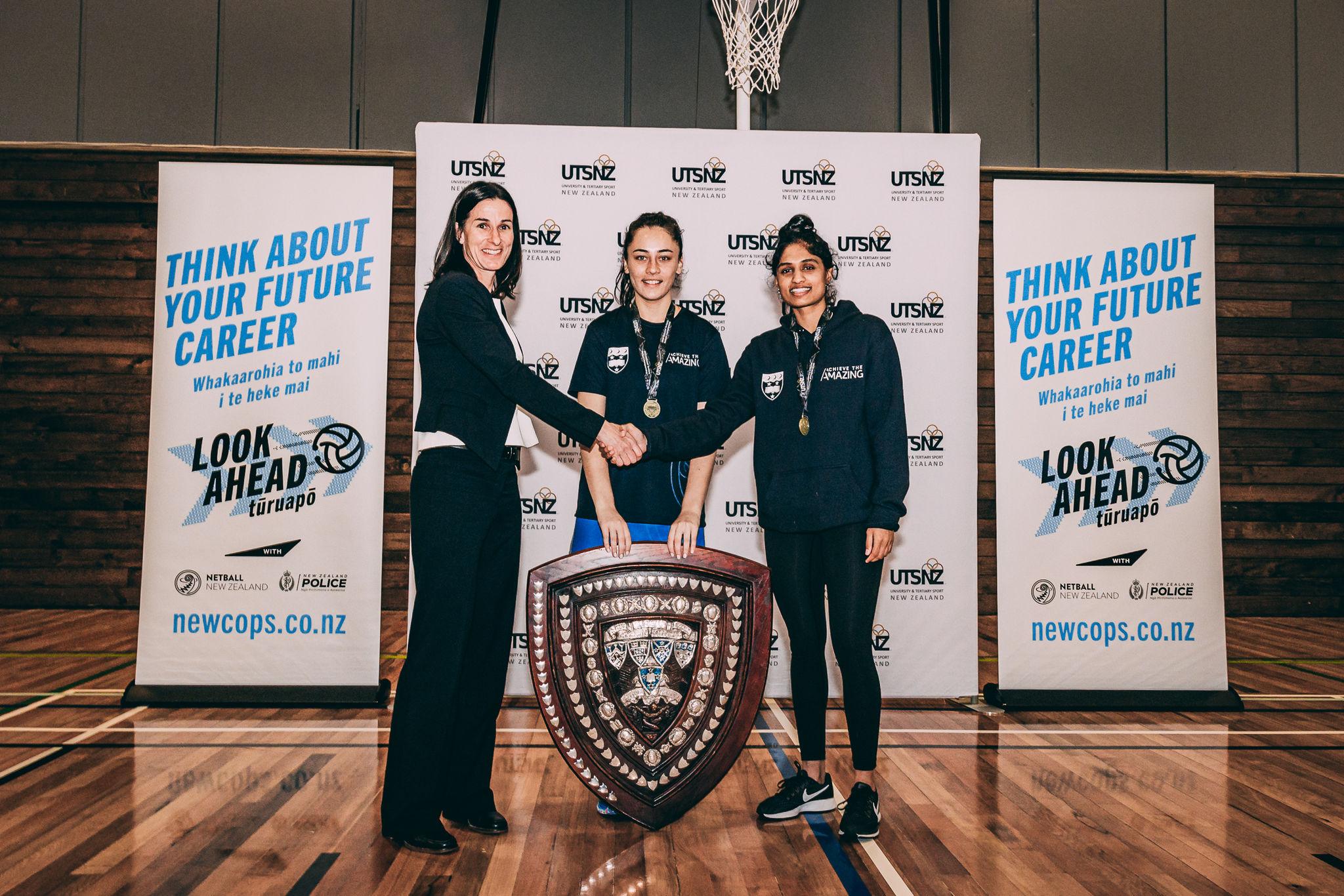 Sarah Anderson presenting the 2019 National Tertiary Championship shield to the University of Auckland Similarly, across the Tasman Sea, one of the key aims of University & Tertiary Sport New Zealand (UTSNZ) is to encourage more research into the value of sport in tertiary settings.
Sarah Anderson presenting the 2019 National Tertiary Championship shield to the University of Auckland Similarly, across the Tasman Sea, one of the key aims of University & Tertiary Sport New Zealand (UTSNZ) is to encourage more research into the value of sport in tertiary settings.
“Off the back of the Active NZ survey report completed by Sport New Zealand, UTSNZ will be shining a spotlight on 18-24 year old participation in sport and in doing so, will provide the university and tertiary sport sector with valuable data, evidence and information relating to this age group,” says Sarah Anderson, Executive Director of UTSNZ.
“A commissioned report planned for 2020 will look at the sports participation habits of those in tertiary education, with all young adults between the ages 18-24,” Anderson explains. “The report will include analysis of weekly participation, time spent participating, average number of activities and will explore motivations and barriers to participation.”
UTSNZ has a positive relationship with the New Zealand Olympic Committee, and it is well recognised that the FISU World University Games offer a great opportunity to expose potential future Olympic and Commonwealth Games athletes to a high-performance multi-sport environment.
“While the New Zealand Olympic Committee (NZOC) manages teams for the Youth Olympic Games, the World University Games offer something these events do not,” Anderson says of the importance of the largest multi-sport event for university athletes. “It is a significantly higher level of competition, a larger scale multi-sport event, and better resembles an experience of an Olympic or Commonwealth Games.”
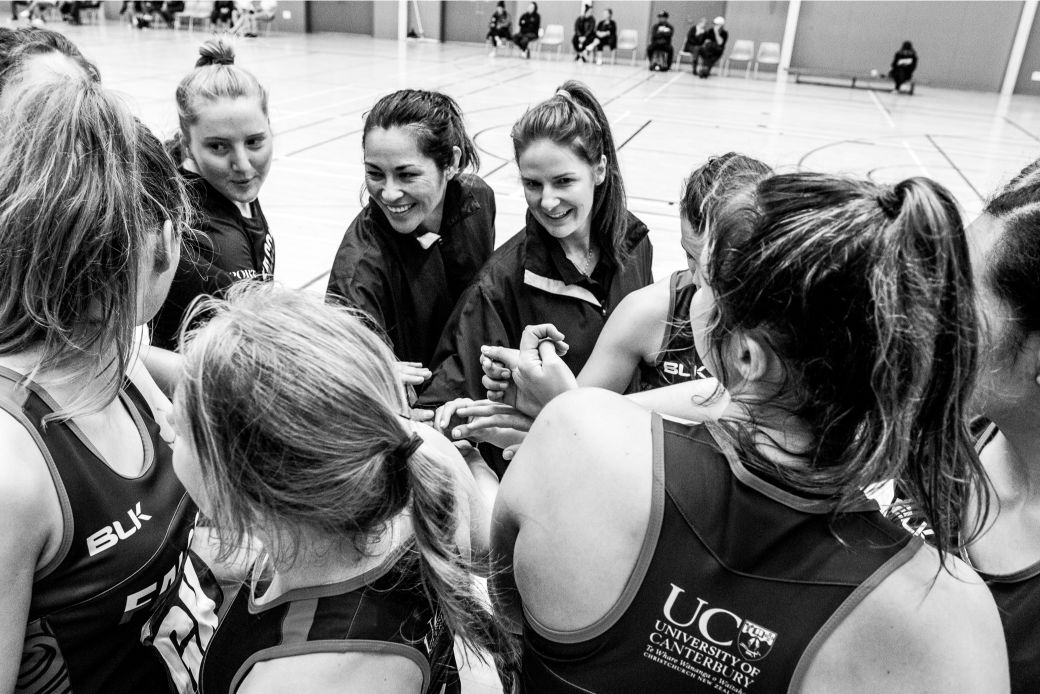
“The NZOC provides UTSNZ with valued guidance and knowledge in sharing tools, templates and good practices to assist in the management of World University Games campaigns and other high-performance events.”
Looking ahead, Anderson is clear that the focus in 2020 will be to raise the profile of university and tertiary sport in New Zealand through increased media engagement.
“One platform to be targeted is New Zealand’s Sky Sport Next,” she says. “It’s an exciting new platform designed to launch and promote New Zealand’s grassroots sport and rising young talent through the livestreaming of events that wouldn’t otherwise have made their way to a leading platform.”
Exciting times ahead, indeed, which David Schmude hopes will also filter onto other members of FISU Oceania that might not be quite as robust as Australia and New Zealand in terms of their sporting structure.
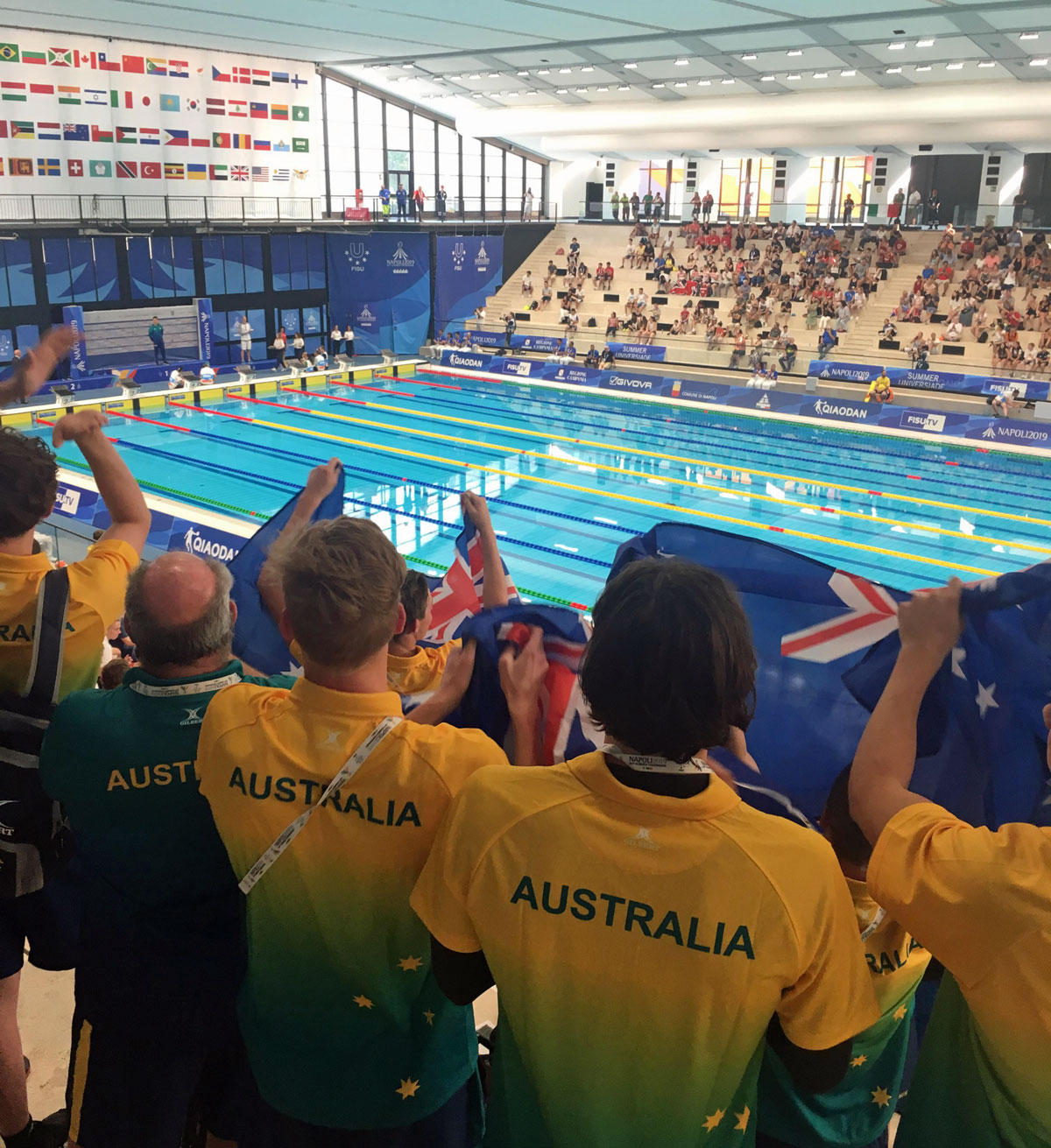 Australian UniRoos supporters were a steady sight in the event stands of Napoli 2019, particularly at the Piscine Scandone swimming complex.“A significant aim for us this year is advocacy for our members,” says Schmude. “We want to give them tools to assist and promote themselves.”
Australian UniRoos supporters were a steady sight in the event stands of Napoli 2019, particularly at the Piscine Scandone swimming complex.“A significant aim for us this year is advocacy for our members,” says Schmude. “We want to give them tools to assist and promote themselves.”
Martin Doulton reiterates the need to strengthen ties between FISU, its continental chapter in Oceania, all eleven member federations and universities and colleges as well.
“From a FISU Oceania point of view, the work done during the (FISU) General Assembly in Turin last November was very good,” explains Doulton. “We developed a Strategic Plan that mirrors the FISU Global Strategy 2027, but with a focus on what can be developed in the islands. For instance, University of South Pacific has campuses in seven member countries, which is quite unique. We will explore how we can work with them and other universities.”
Schmude continues, “I think more engagement is one of the key things we’re aiming to have, especially with regard to use of development funds. We’ve got members in the islands who have trouble with basic internet and even electricity. We want to get across there and promote FISU and get everyone involved again.”
“I think projects like the FISU Healthy Campus are great opportunities for us,” he adds.
The National Tertiary Championship events supported and delivered by UTSNZ will run through the year, starting with Rowing in April and ending with Netball in September. Other sports in this calendar include Basketball (3×3 and 5×5), Futsal, Badminton, Volleyball, Hockey, Ultimate and Table Tennis.
The National Tertiary Championship events are often a pathway for athletes to be selected for international honours at FISU events like the World University Championships, University World Cups and the World University Games.
Similarly, at UniSport Australia, the year-long season will culminate in a combined Division 1 and Division 2 National Finals in later September. The Nationals will see universities from across Australia come together to compete for championship glory across more than 25 sports on offer.
Perhaps as always, these events will provide a preview of future Olympians and international sports stars. Much to look forward to, in university sport in Oceania.
